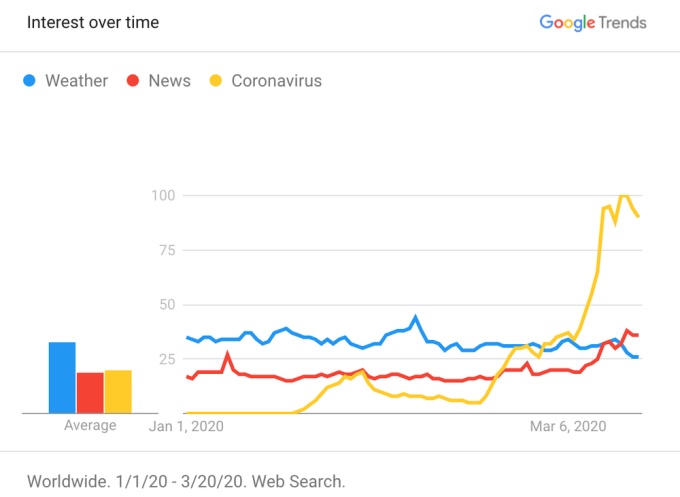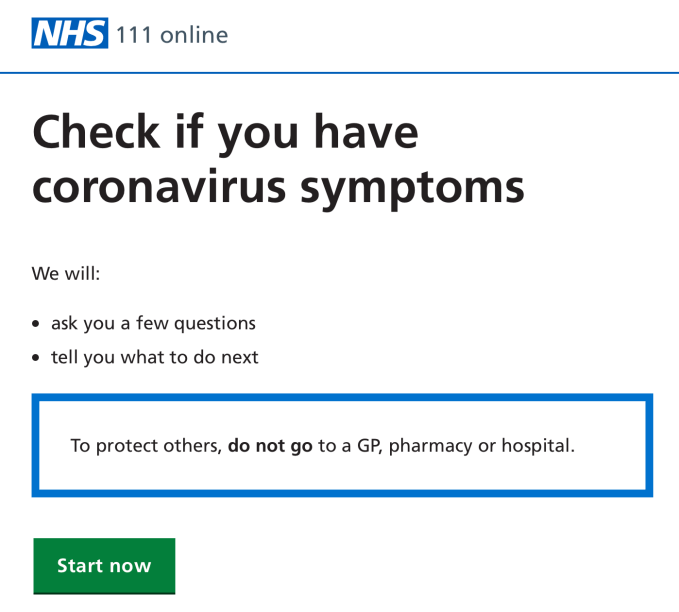Google launches Covid-19 page and search portal with safety tips, official stats and more, US-only for now
Google says Coronavirus has become its biggest search topic by a country mile this year, and to continue its efforts to harness that attention in the best possible way, late on Friday the company launched a new information portal dedicated to the pandemic as well as an improved search experience for desktop and mobile.
The search experience, Google says, was updated in response to “people’s information needs expanding,” while the new information portal also provides the basic, most useful information (for example around symptoms), plus a lot of links and on-site options to explore further.
![]()
Something notably absent on Google’s page or search experience are any links to conversation forums or places to hear and talk to other average people. Google has never been particularly successful in its many efforts to break into social media and this underscores that, while also helping it steer away from the fact that many of these forums are not always well managed. I would imagine that more tools for direct communication, such as the Google Hangouts product, and possibly others in that same category, might well be added or linked to as well over time.
Let’s dive into some more details.
The new search experience now not only includes search results but also a number of additional links to “authoritative information” from health authorities and updated data and visualisations.
“This new format organizes the search results page to help people easily navigate information and resources, and it will also make it possible to add more information over time as it becomes available,” Emily Moxley, Google’s product manager for search, writes in a blog post.
The search experience now also includes links to a Twitter carousel featuring accounts from civic organizations local to you, and also a new “most common questions” section related to the pandemic from the World Health Organization and the Centers for Disease Control and Prevention.
This is rolling out first in the US in English and Google said it would be adding more languages and regions soon.
Meanwhile, the portal — also available first for the US — features tips on staying healthy and advice for those who are concerned; links to further official resources; links to more localised resources; links to fundraising efforts; the latest statistics; and an overview of all of Google’s own work (for example, the specific efforts it’s making for educators). We have asked the company when and if it plans to cover other regions beyond the US, and we’ll update this as we learn more.
This is an important move for Google. The internet has figured as critical platform from the earliest days of the Novel Coronavirus emerging out of China, but it hasn’t all been positive.
On one hand, there has been a ton of misinformation spread around about the virus, and the internet overall (plus specific sites like Google’s search and social media platforms like Facebook and Twitter) has played a huge role in being responsible for disseminating the majority of that bad news. (Not all those searches and clicks lead to the right information, or good data, unfortunately.)

On the other hand, it’s also been an indispensable resource: in countries where health services have already become overwhelmed by the influx of people seeking help, official online portals (like this one) are serving a very important role in triaging inbound requests before people resort to physically getting themselves into the system (if they need to). And the internet is the main place people will turn in the days and weeks ahead as they are asked to socially isolate themselves to slow down the spread of the pandemic, serving its role in providing information, but hopefully also some diversion and enrichment.

Google’s site is bringing together as many of the positive and legitimate strands of information as it can.
The main page focuses on the most important basics: an brief overview of the virus, a list of the most common symptoms, a list of most common things you can do to prevent getting infected or spreading the infection and a (very brief, for now) section on treatments.
From this, it goes on to more detailed links to videos and other resources for specific interests such as advice for the elderly, a map-based data overview to monitor what is going on elsewhere; and then resources for further help for topics that are coming up a lot, such as advice for people working from home, or for how to set up self-isolation, online education advice, cooking resources and more. Relief efforts so far only has one link, to the Solidarity Response Fund started by the UN Foundation, which has had a donation of $50 million from Google. \
There are a number of other relief and fundraising efforts underway, including those to help fund the race for research to improve the medical tools and medicine we have to fight this. I think the idea is that all of these sections will grow and evolve as the situation evolves.
from TechCrunch https://ift.tt/33yyb8v
Comments
Post a Comment